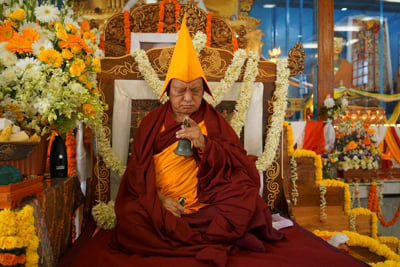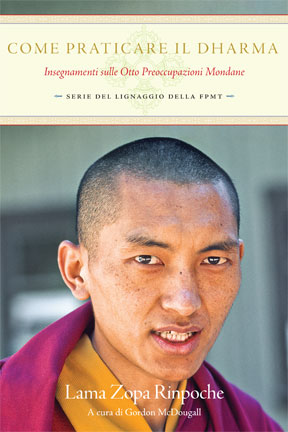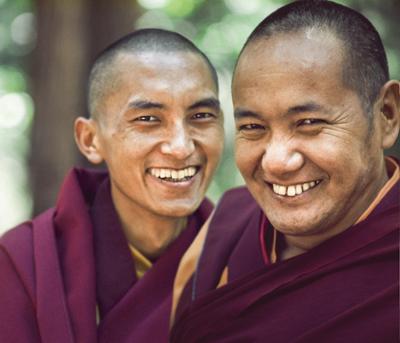Dear Friends and Supporters,
Our sincere thanks to those of you who donated to the Archive on Chokhor Duchen, the Festival of Turning the Wheel of Dharma. We rejoice in your merit as together we make these precious Dharma teachings available every day to everyone, everywhere.
Read on for updates on all our latest projects, including new teachings and advices on our website, new translations and ebooks, and newly published video and audio from our archive.
What's New on our Website
 This month you can read one of Lama Zopa Rinpoche's teachings from the 42nd Kopan Lamrim course in 2009. In this discourse Rinpoche teaches on karma, the eight worldly dharmas, and other lamrim topics. Lightly edited by Gordon McDougall and Sandra Smith.
This month you can read one of Lama Zopa Rinpoche's teachings from the 42nd Kopan Lamrim course in 2009. In this discourse Rinpoche teaches on karma, the eight worldly dharmas, and other lamrim topics. Lightly edited by Gordon McDougall and Sandra Smith.
An excerpt on the eight worldly dharmas is included below as this month's eletter teaching. We will be publishing all of Rinpoche's teachings from this course as an ebook, forthcoming in September.
We have also just posted a talk by by Tenzin Ösel Hita on Educating the Heart given at Jamyang Buddhist Centre, London, in January 2017. In this talk, Ösel discusses the inner values which enable us to live a meaningful, peaceful and harmonious life. You can watch video of this talk on YouTube.
Two New Releases From our Video Archive
Watch Rinpoche’s inspiring talk in March 2013 to the students of Amitabha Buddhist Centre in Singapore on the reasons why working together to create Dharma centers is so important. In this talk Rinpoche tells us:
"Working for a Dharma center—whatever work is done, the main thing is to reveal the teachings, to educate sentient beings, to reveal the teachings to sentient beings, and for the sentient beings to understand and to practice."
You can follow along with the lightly edited transcript on our website.
And this month we also bring you a wonderfully sweet glimpse into the past with a video of Lama Zopa Rinpoche and a very young Tenzin Ösel Hita visiting students in Holland in 1986.
Be sure to visit and subscribe to the LYWA YouTube channel to view dozens more freely available videos from our archive.
New This Month in the Online Advice Book
This month's new additions to Lama Zopa Rinpoche's Online Advice Book include:
-
An Introduction to Buddhism: In this long letter with many quotes, Rinpoche explains the importance of Dharma practice for a happy and meaningful life.
-
Tonglen Prayer: Rinpoche gave this advice about tonglen (taking and giving) to a nun who was close to passing away due to cancer.
-
 Guiding Children to a Happy Life: Advice about raising children, given to students at Copenhagen Airport, Denmark.
Guiding Children to a Happy Life: Advice about raising children, given to students at Copenhagen Airport, Denmark. -
The Quickest Path to Enlightenment: In this card, sent to a kind student and her son, Rinpoche expressed his appreciation for their practice and explained the benefits of correct devotion to the guru:
The most important thing, the key practice, is pleasing the guru. That is the best offering. It purifies unbelievable obscurations and negative karma collected from beginningless rebirths, and it collects the most extensive merits and causes us to actualize the path to enlightenment, to achieve enlightenment quickest. Then no question about all the temporary success. It is the best, the quickest cause of success.
As always, you can see a list of all the newly-posted advices on our website.
This month’s podcast: Why We Need to Practice the Dharma
 Discovering the truth of the I is an essential discovery. So, in this life, while we have this precious human body, we should make this discovery; we should realize the ultimate reality, the truth, of the I.
Discovering the truth of the I is an essential discovery. So, in this life, while we have this precious human body, we should make this discovery; we should realize the ultimate reality, the truth, of the I.
-Lama Zopa Rinpoche
This month's podcast is drawn from Lama Zopa Rinpoche's teachings in June, 2008 at the White Eagle Conference Center in Crestone, Colorado. Rinpoche explores why we suffer, how to find the I that causes us to suffer and why we need to practice the Dharma right now. Read along with the transcript on our website.
The LYWA podcast contains hundreds of hours of audio, each with links to the accompanying lightly edited transcripts. See the LYWA podcast page to search or browse the entire collection by topic or date, and for easy instructions on how to subscribe.
New Italian Translation of How to Practice Dharma
 We are pleased to announce the Italian translation of a book from our FPMT Lineage Series, Come Praticare il Dharma (How to Practice Dharma) translated by Carolina Lami.
We are pleased to announce the Italian translation of a book from our FPMT Lineage Series, Come Praticare il Dharma (How to Practice Dharma) translated by Carolina Lami.
The main topic of Come Praticare il Dharma is the eight worldly dharmas. Teachings on this topic have proven to be one of the most important in Rinpoche’s overall presentation of the Dharma and have benefited so many people.
The FPMT Lineage Series is a collection of books of Lama Zopa Rinpoche’s teachings on the graduated path to enlightenment (lamrim) drawn from Rinpoche's four decades of discourses on the topic based on Rinpoche's own textbook, The Wish-fulfilling Golden Sun, and on several traditional lamrim texts, and in general arranged according to the outline of Pabongka Rinpoche’s Liberation in the Palm of Your Hand.
This Italian translation of this precious text is now available as an ebook and a paperback through Amazon. We also look forward to announcing more translations of titles from the FPMT Lineage Series.
You can freely download the first chapter of the translation from our website. LYWA books have been translated into 16 languages and you can see a list of them all on our website.
Preparing for Rinpoche's visit
We are eagerly awaiting the arrival of Lama Zopa Rinpoche to Boston in mid-August. Rinpoche will be giving teachings at Kurukulla Center and we hope that he will also visit us here at the Archive. We will give a report and photos in our next eletter.
Thank you all so much for the incredible support you offer, which allows up to do this amazing work of preserving the precious teachings of Lama Yeshe and Lama Zopa Rinpoche and making them available to the world.
Much love,
Nick Ribush
Director
This Month's Teaching: PROBLEMS COME FROM FOLLOWING THE EIGHT WORLDLY DHARMAS
 You need to purify and collect extensive merits. From that, realizations will come, even though at the beginning you think it’s impossible. For example, at the beginning you probably think, “Without attachment how can I live my life?” “How can I even survive without a selfish mind?” That’s very common in the West.
You need to purify and collect extensive merits. From that, realizations will come, even though at the beginning you think it’s impossible. For example, at the beginning you probably think, “Without attachment how can I live my life?” “How can I even survive without a selfish mind?” That’s very common in the West.
Of course, even without being Buddhist, there are many people in the West who have a good heart in their daily life. I have met many really good people. They have no knowledge of Buddhism, but they are very kind to others: their family, those around them, animals and so forth. When I say they have a good heart, I mean a kind of selflessness. There are different levels, but for these people, they always think of others before themselves. Others’ happiness comes first. There are many people like that even without meeting Buddhism.
But overall what people believe is that without a selfish mind there is no way you can live. There is no life without a selfish mind. If you are living, you have to have a selfish mind, you have to have attachment. I don’t know whether you agree or not, but I think this is the general attitude in the West. You have to have attachment, anger and all these things! How is it possible to have life without attachment, without desire? People don’t see that attachment is delusion.
This is how people think at the beginning. How is life possible without attachment, without a selfish mind? Impossible! But then later, by studying and meditating on those incredible, unbelievable teachings of the Buddha—and not only the Buddha but also those great pandits, and the great Tibetan lamas like Lama Tsongkhapa, Milarepa and many others—we find that it is possible. Milarepa is known a little in the West from people who have read his life story or have heard about his amazing experiences and all the tantra realizations he had based on bodhicitta.
Only later, by listening to the teachings, by reading, analyzing and meditating, your mind changes and you understand life—how practicing the good heart, the selfless attitude, living life without attachment but with renunciation, brings about a really healthy, peaceful mind, free from worries and fears. You no longer have the ups and down caused by worldly concern, by attachment to the comforts and pleasures of this life. I’m not talking about enlightenment or liberation here, I’m not even talking about future lives’ happiness. I’m just talking about grasping onto today’s pleasure; grasping onto reputation, wanting to become famous in the world; wanting praise, wanting people to praise you; and grasping onto material objects such as gifts. These are the four desirable objects of the eight worldly dharmas.
When you don’t get any of these four things there is dislike, unhappiness. This is the opposite of the four desirable things, and so you have all the worries and fears about these four undesirable things happening: not having comfort, not having reputation, not having people praising you and not having material possessions. When you have the four desirable things your life goes up and when you don’t have them, when it’s the opposite and you have the four undesirable things, your life goes down. Your mind becomes negative, worried, angry. These worldly concerns lead to unhappiness and depression. There is so much depression in the West because of this.
Now you can see what kind of mind creates depression. With all the attachment to this life, grasping onto these four desirable objects, when this doesn’t happen, then depression comes. Depression doesn’t come from outside; it comes from your own mind. What kind of mind does depression come from? It doesn’t come from the mind of wisdom realizing emptiness nor does it come from bodhicitta, from loving kindness or compassion. It comes from the evil thought of the eight worldly dharmas, this attachment that grasps onto these four desirable objects. Not getting what attachment wants, what the self-cherishing thought wants, triggers depression. It happens in this way more than getting depressed in the evenings or mornings.
It is mentioned in the teachings by the Buddha that getting depressed at certain specific times is related to having committed sexual misconduct in the past. The person can’t tell why there is depression at these particular times, but this is due to past negative karma of having done actions of sexual misconduct with this evil thought, the eight worldly dharmas.
This is an extremely important subject, even on a purely psychological level, without thinking in a Dharma way about it. If you analyze where depression comes from you will see it is this and, once you know that, you have a method to cure it. You are able to use the technique to heal this evil thought of the eight worldly dharmas, this wrong concept, this mistaken way of thinking.
The conclusion is this. With the evil thought of the eight worldly dharmas, you always suffer; you always have problems in the life. You suffer when these four undesirable objects happen, the opposite of the four desirable objects. When the four desirable objects don’t happen you get into problems. They are created by your own mind, this attachment clinging to this life. This worldly concern, that concept, gives you problems, such as depression, unhappiness, anger and so forth and because of that you create negative karma again and have to experience the same thing again in the future.
That’s when you receive the four undesirable objects, but even when you receive the four desirable objects, the mind that grasps onto those objects is suffering. That clinging mind itself is suffering, is a problem. You still have problems in your life; your heart is still without peace.
When you analyze whether the mind clinging to these things is peaceful or not at that time, you will find that it is not peaceful. The clinging causes disturbances on your mind. There’s no peace, no satisfaction. The only thing you get is dissatisfaction, so that’s a huge problem.
What you want is a healthy, peaceful mind. That’s what Dharma means—a totally healthy, peaceful mind, a mind filled with inner peace and satisfaction. It is a mind free from this evil thought of the eight worldly dharmas, this attachment, this worldly concern. When there is Dharma there is incredible stability in your heart, incredible stability in your life. You are peaceful and calm.
From Lama Zopa Rinpoche's teachings at the 42nd Kopan Lamrim Course in 2009, edited by Gordon McDougall and Sandra Smith. You can read the rest of the lecture here. For more teachings on the eight worldly dharmas see Rinpoche's book How to Practice Dharma.































